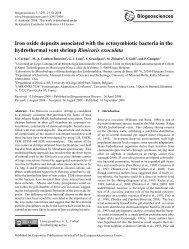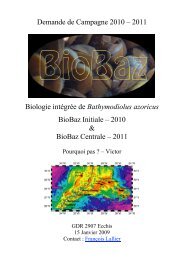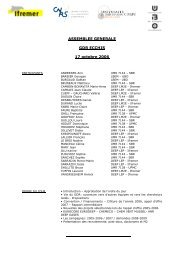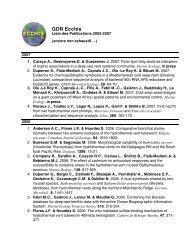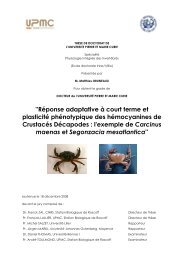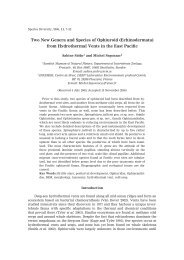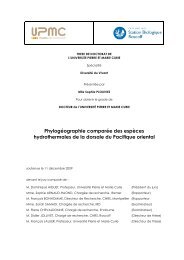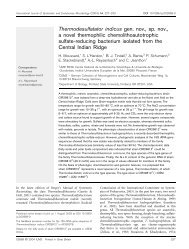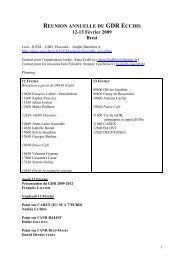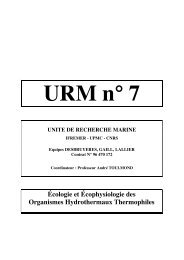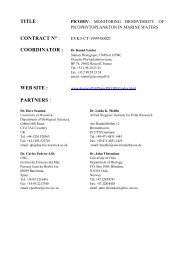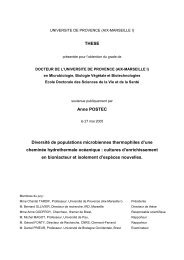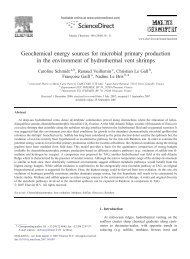European Ocean Research Fleets - uefiscdi
European Ocean Research Fleets - uefiscdi
European Ocean Research Fleets - uefiscdi
Create successful ePaper yourself
Turn your PDF publications into a flip-book with our unique Google optimized e-Paper software.
© Ifremer<br />
© UTM-CSIC<br />
RV Pourquoi pas?, a Global <strong>Research</strong> Vessel<br />
Global RV Hesperides crossing the Gerlache strait in Antarctica<br />
Conclusions<br />
This report provides a unique opportunity to present to<br />
<strong>European</strong> and international decision makers an up-todate<br />
status of <strong>European</strong> research fleets, and proposes<br />
new steps forward as required by the ambitious mandate<br />
that the OFWG received in 2004.<br />
It has been difficult to gather the data concerning <strong>European</strong><br />
fleets to complete the fleet survey. Some of the<br />
information is still missing but the main actors gave<br />
significant inputs to this report and the resulting tables<br />
and figures are clear.<br />
As a whole, <strong>European</strong> fleets are confirmed as a magnificent<br />
scientific tool, comparable to the US one.<br />
The scientifi c equipment component has been surveyed<br />
for the first time; the <strong>European</strong> equipment set<br />
is very diverse and foremost in the world.<br />
Overcapacity is not a reality, and renewal remains necessary.<br />
The old Regional fleet – representing 20 ships<br />
in a total of 46 – is in a highly dangerous condition.<br />
This tool box opens a wide range of independent possibilities<br />
for cooperation. It is not a theoretical global<br />
<strong>European</strong> plan which will never be used.<br />
First of all, as the main funding providers for scientifi c<br />
fleets, a lot of initiatives involving short-term decisions<br />
are proposed to National authorities. <strong>European</strong> governing<br />
bodies are requested to support some innovative<br />
projects to foster cooperation. The Marine Board<br />
Member Organisations could drive some other initiatives,<br />
such as the launching of new pools of vessels<br />
and equipment.<br />
It is proposed that a lot of other <strong>European</strong> actors, such<br />
as OFEG, ERVO or Eur<strong>Ocean</strong> facilitate the development<br />
of partnerships within Europe as with the USA and the<br />
rest of the world.<br />
The majority of all these key players participate in the<br />
MarinERA project (FP6 ERA-NET project). The OFWG<br />
hopes that some of the recommendations could be further<br />
considered within the frame of MarinERA, and lead<br />
to rapid success.<br />
The OFWG also studied the numerous successful cooperation<br />
schemes; scientific fleets appear as an important<br />
partnership application within Europe.<br />
For section B of the report, the OFWG decided to raise<br />
pragmatic recommendations: eight, concerning ships<br />
and equipment and how to use the existing fleet more<br />
effi ciently; three to widen scientifi c access to it; and<br />
finally, five concerning long-term strategy.<br />
<strong>European</strong> <strong>Ocean</strong> <strong>Research</strong> <strong>Fleets</strong> | 37



